Michael Pittman Jr. Can't Catch a Pass
Other than idly tossing a football to himself in self-isolation at his Santa Ana, Calif., apartment—up, down, up, down—Michael Pittman Jr. hasn’t caught a single pass since the middle of March. Were this any other year, perhaps such news would raise eyebrows in NFL front offices, especially entering the upcoming draft, where the USC wideout is considered a mid-second-round candidate. Then again, this is a year like no other.
It’s not that Pittman, 22, is injured. He still trains daily at a public park, darting through cones and running routes under the socially distanced supervision of former NFL receiver T.J. Houshmandzadeh. That element of his predraft routine has continued largely uninterrupted, excepting one recent afternoon when the police paid a visit. But, whereas he was once hauling in spirals from the likes of Sam Darnold, Josh Allen and presumptive No. 1 pick Joe Burrow at these workouts, Pittman hasn’t even seen those quarterbacks in nearly a month; he’s relegated, instead, to tracking invisible passes into his palms to avoid the potential health risk of catching real ones.
“The last time I touched a football from another person?” says Pittman, sounding almost wistful at the notion. “It’s been a while. Definitely, definitely weird.”
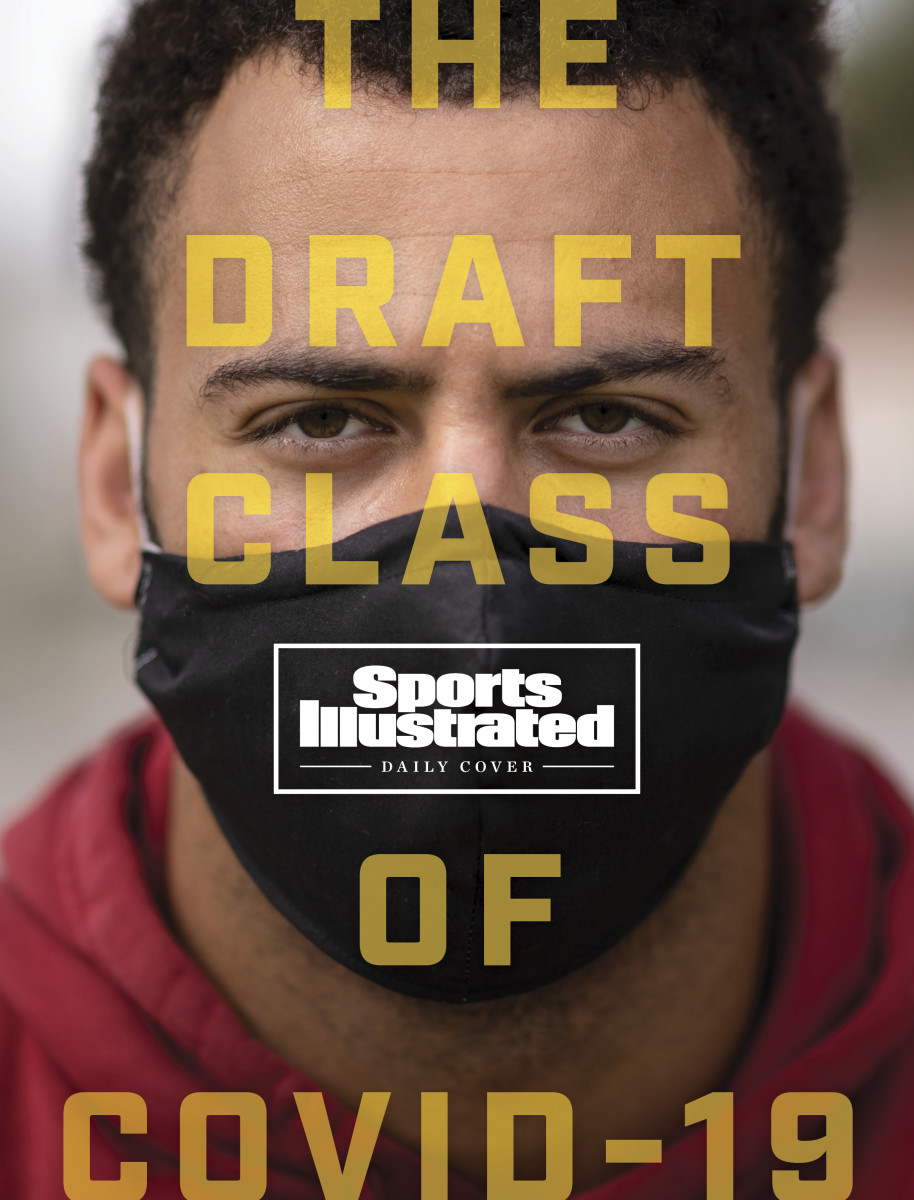
This warped reality is a tiny issue in today’s grand scheme, yet it’s one that every NFL prospect must navigate. Pro days and team visits have been canceled on account of the COVID-19 pandemic, replaced by hastily filmed workout footage and Zoom chats. The draft itself will be an all-remote affair, as GMs enter their selections from virtual war rooms and commissioner Roger Goodell announces them from his Westchester, N.Y., lair. As for minicamps, rookie symposiums and the rest of the standard offseason calendar—who knows?
“For rookie [initiation], maybe the veterans will have us go out and buy them toilet paper,” Pittman jokes of the hard-to-find essential. “I haven’t really thought about it all, to be honest. I’m just worrying about getting drafted.”
Listed at a sturdy 6' 4" and 223 pounds; blessed with NFL bloodlines, flytrap hands (he led the Pac-12 with 101 receptions and 1,275 yards last fall) and a calm demeanor evident from the football field to the open sea, Pittman stands out even among a potentially historic group of receivers. And yet his story isn’t all that different from any other in his draft class. Until the novel coronavirus shut down sports and laced life with constant uncertainty, no football player had ever faced such circumstances in the lead-up to his life’s dream being realized. Now everyone is experiencing it together.
“It’s almost like we don’t know any better,” says Pittman. “We’ve never gone through this process before. It’s new—but it was always going to be new. That’s how I’m trying to look at things.”
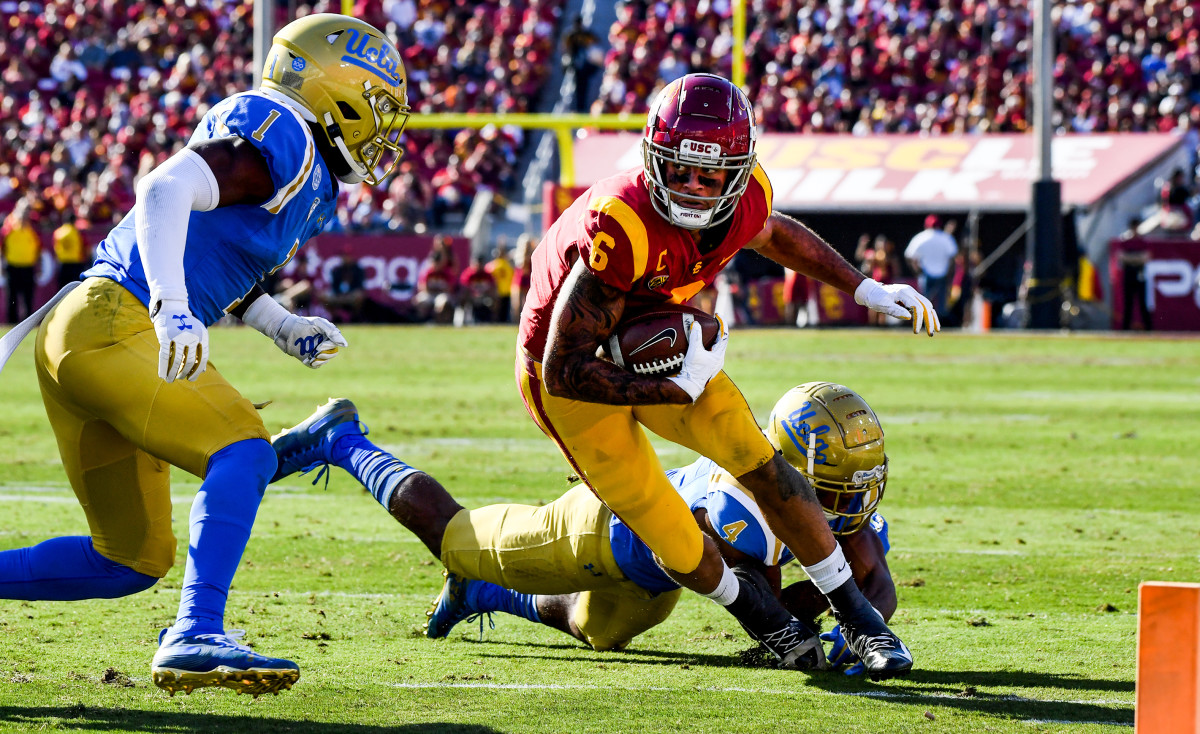
* * *
Technically, this isn’t Pittman’s first time experiencing the draft up close. Not that he could be expected to recall any details. Born in October 1997, he was barely six months old when the Cardinals tabbed his father, Michael Sr., a burly running back from Fresno State, with the third pick of the fourth round. “I never really questioned if I could make it,” Michael Jr. says now. “I always thought, ‘Hey, my dad did it. I’mma do it too.’ ”
The NFL was a constant presence from that moment on. The pirate cannon booming at Raymond James Stadium, where Michael Sr. spent six of his 11 seasons, with the Buccaneers. The fans flocking to the Pittmans’ TGI Friday’s table for pictures with the Super Bowl XXXVII champion, and the one woman who asked the running back to autograph her baby outside the players’ entrance after one of Tampa’s games. (He declined.) Sometimes Michael Jr. would even tag along to the Bucs’ facility, battling his younger brother, Mycah (now a rising sophomore receiver at Oregon), on the players’ lounge pool table until practice ended. “I remember being really young, walking into the locker room and everyone was naked, and I didn’t understand what was going on,” he says. “That’s my most memorable [image].”
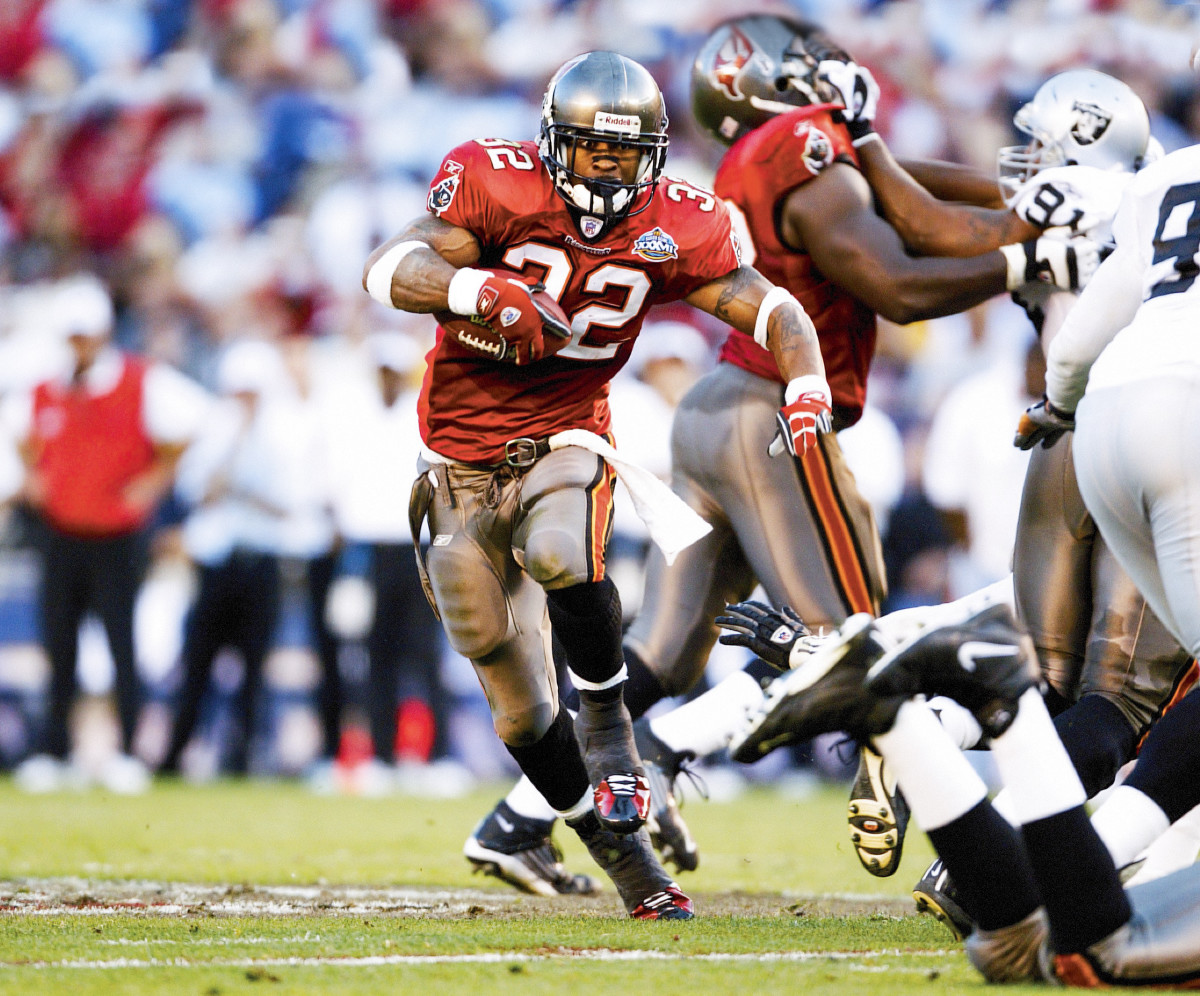
After living full-time with his mother and stepfather through middle school, Michael Jr. moved in with his father entering ninth grade at Valencia (Calif.) High, in 2012. Dad had retired from football, briefly forayed into coaching as an intern on Mike Shanahan’s Redskins staff, and moved west. Until that point, Michael Jr. had been focused on following his namesake as a running back, but a growth spurt (“I was like 6' 3", 130, bone dry”) and a lack of reps as a freshman forced father and son into a tough conversation. “I looked at him,” Michael Sr. recalls, “and was like, ‘You’re not going to play running back anymore.’ ”
“What do you mean?” Junior fired back, fuming at the idea his father thought he couldn’t hack it at the family trade.
“You’re going to be tall,” Senior explained. “You’re going to be explosive. You’re going to end up playing receiver. And you’re going to be known as one of the best in the country.”
Here Dad provided an initial nudge—not to mention countless hand checks, arm bars and shirt tugs as they began squaring off in route-running drills at a local park, Michael Sr. playing press coverage, Michael Jr. trying to shake him. “We’d battle,” says Michael Sr. But the elder Pittman also saw the limitations of his backfield experience, leading him to hire former UCLA receiver Mike Sherrard, who played 105 games for four NFL teams, as a proper position coach for his son.
Michael Sr. asserted his influence in other ways, too. When his son struggled early on to find reps at USC and caught only 29 passes across his first two seasons, he fired off a series of tweets, in October 2017, blasting the Trojans’ staff for “watching my kid just sit on the sideline.” Two years later, Michael Jr. hauled in more passes than any Trojans wideout since Nelson Agholor in ’14. For his work he was named a Biletnikoff Award finalist, as one of the nation’s top receivers.
Now that Michael Jr. is embarking on the next phase of his life, his dad has, naturally, offered some more advice. “He just says: ‘Enjoy the day. Stay calm. Don’t get frustrated if you don’t get picked where you want. It’s a day to celebrate, a life-changing day.’ ”
Whereas Michael Sr. recalls sweating through his draft-day experience, pacing around his parents’ garage, biting his nails and staring at the phone until it finally rang, at pick No. 95, Michael Jr. has never had issues with nerves. His reputation as a cool customer was burnished in November 2015 when he recorded a ridiculous 354 receiving yards and five touchdowns during his final high school appearance (for Oaks Christian, where he'd transferred as a sophomore at Michael Sr.'s behest). Two years later, it was solidified when he set a Pac-12 championship record with 146 receiving yards. Of his big-game excellence, he says: “It comes natural. I’ve never been the type to overreact to things.”
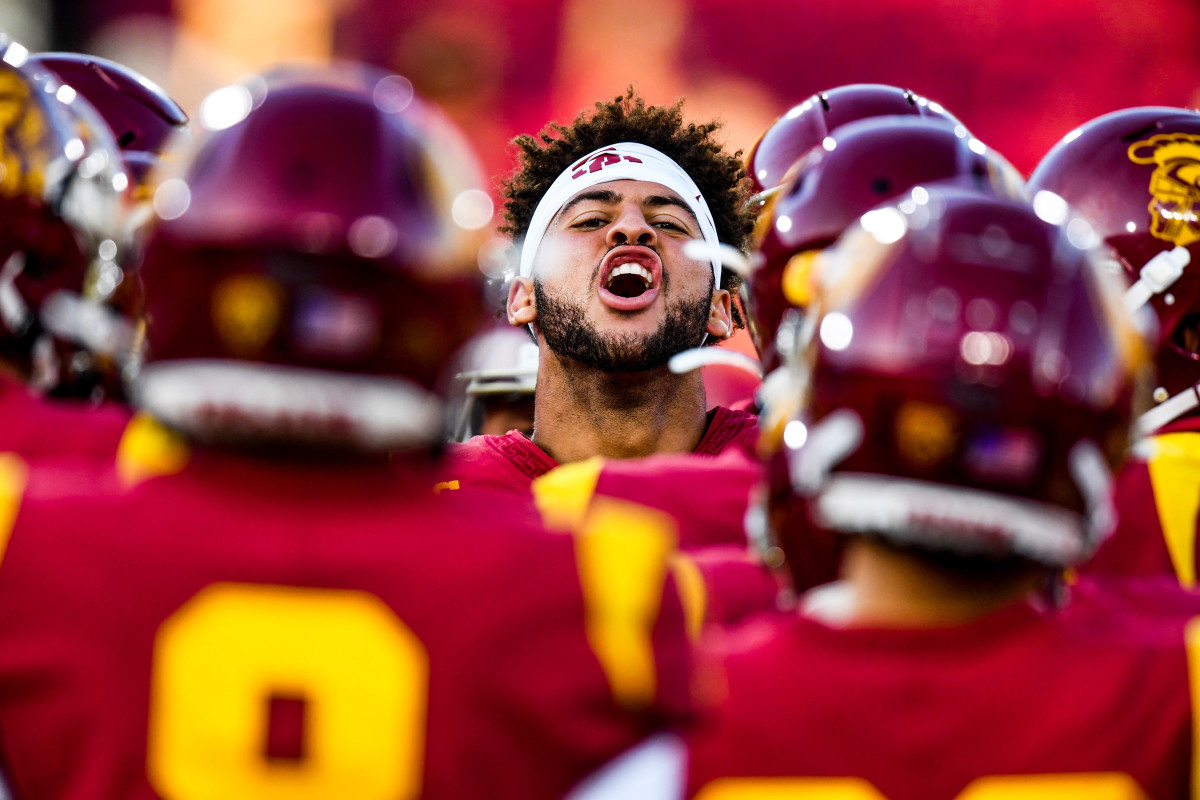
Consider the way he found his strongest passion outside of football: spearfishing. One day in college, eager for a new challenge after years of saltwater fishing, he bought a cheapie speargun on Craigslist and plunged into a shallow Pacific Ocean reef, 250 yards offshore, by himself. “Which is very dangerous,” he points out. “I had my friend [nearby], but in hindsight, what was he going to do if I blacked out?”
More than true aim or strong lungs—elite spearfishers can hold their breath for more than five minutes, Michael Jr. says; he tops out around two—the method requires a steely heartbeat. To panic is to waste precious oxygen. And even though he unwisely embarked with neither experience nor safety net on that first outing, he emerged above the surface both unharmed and fully hooked on the hobby, thrilled over having conquered those uncharted waters.
* * *
After returning home in late February, following the NFL combine, Pittman stole away for another spearfishing trip before resuming his training for a pro day. “That was my break,” he says. Diving off the coast of Santa Catalina Island, wielding a significantly nicer weapon than his Craigslist purchase, Pittman came away with a sheepshead and a calico bass—not too shabby considering that for more than a year football had kept him from honing this new skill. “I’d like to go again,” he says. “But with all the quarantining, I’m trying to chill out a bit.”
Like pretty much everyone across the sports landscape, Pittman got a reality check when Utah Jazz center Rudy Gobert tested positive for COVID-19 on March 11 and the NBA suspended its season. “It’s not that I wasn’t taking it seriously, but I didn’t understand the level it would get to,” he says. Before long, his pro day was canceled. Then the weight room, where he’d been lifting five days a week, closed shop. His on-field workouts were declared quarterback-free zones, limited to four wideouts at a time, spaced 10 to 15 feet apart throughout. Heaven forbid anyone high-five after a drill.
Today, gym bags are left in cars and cleats are tied curbside. Hand sanitizer is liberally spritzed from liter bottles and only Houshmandzadeh touches the cones. Adhering to public health mandates across SoCal, players also recently began wearing face masks while training. Pittman dons a simple black-cloth version that his mother made. “If we’re just working routes and not touching, it’s not 100% safe,” Houshmandzadeh says. “But it’s as close as we can get.”
Of course, the safest option would be to stay inside altogether. Certainly it was that line of thinking that led some concerned Orange County denizen to dial police and report a small group of athletes chewing up grass at a park in late March. An officer eventually arrived, talked to Houshmandzadeh, watched for a half-hour to ensure everyone was obeying social distancing guidelines, and then thumbs-upped the workout before driving away. Even so, the incident underscores the greater challenge everyone faces today, whatever their walk of life: How do you maintain even a modicum of normalcy in these times of immense upheaval?
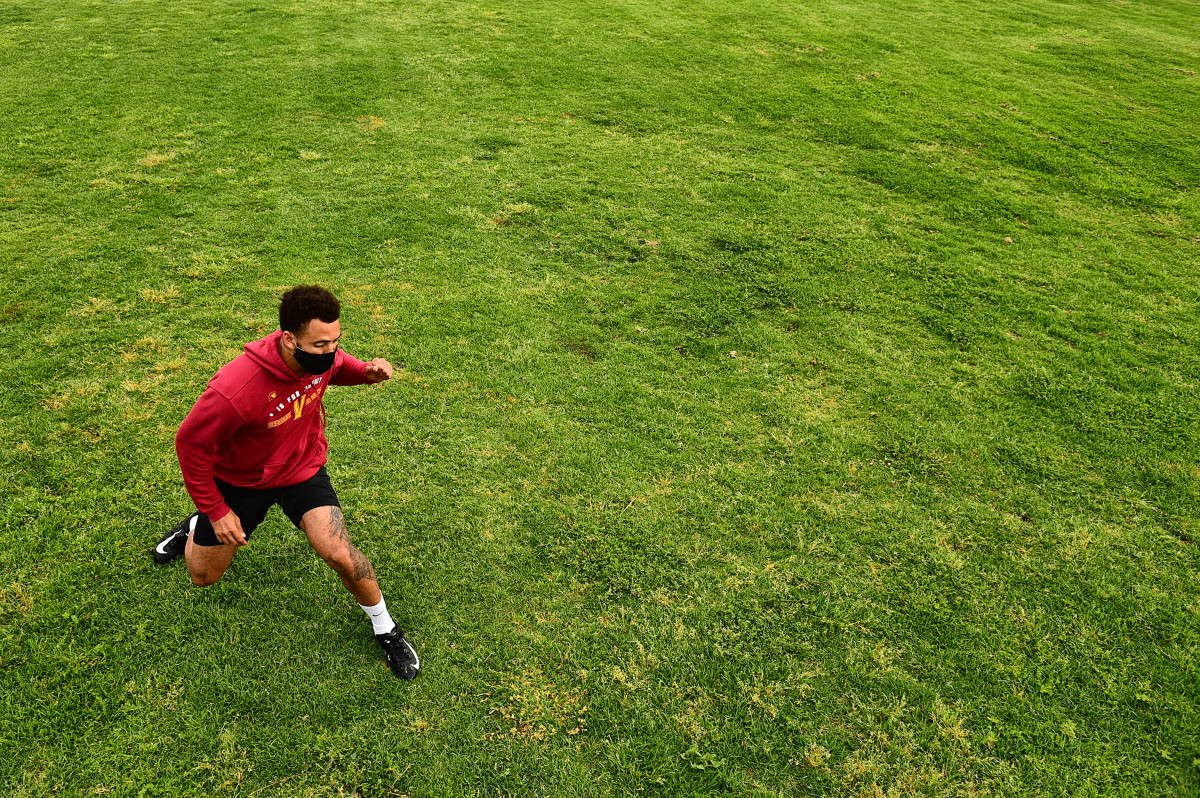
“It’s been a challenge for everybody,” says Travelle Gaines, another L.A. trainer, he with eight draft prospects on his 2020 roster. “My heart goes out to these kids who’ve waited their whole lives to play in the NFL and now have this super level of uncertainty.”
One of Gaines’s clients, UCF receiver Gabriel Davis, decamped from L.A. to Florida in mid-March, only to discover the school had closed its workout facilities, forcing him to traverse the country again, flying back to California. Another client, Florida State cornerback Levonta Taylor, wound up moving in with his high school trainer in Norfolk, Va., where he too attracted the attention of local law enforcement for filming—replete with multiperson camera crew and overhead drone—a personal pro day at a nearby field. “At first they said we had too many people out there and they were going to shut us down,” says Taylor. “But we explained what we had planned. … They said everyone just had to be spaced out ... and they gave us 25 minutes. [We] did it real fast.”
For Taylor, the potential payoff was more than worth the trouble. Once the No. 1 cornerback in the 2016 recruiting class, he suffered an up-and-down career with the Seminoles and failed to earn an NFL combine invite, leaving him eager to snag any opportunity to boost his draft stock. After hiring a video producer to cut footage of him running the 40-yard dash and other drills, Taylor uploaded the final cut to Google Drive and asked his agent to share the link with all 32 front offices. “I could’ve been at home,” Taylor says, “but I wanted to make sure teams see who I am.”
Here he is far from alone. Alabama quarterback Tua Tagovailoa snapped off 72 passes in his own “virtual” pro day, giving prospective employers a better chance to gauge his progress in recovering from reconstructive hip surgery. And quarterback Tom Flacco, a potential late-round pick out of Towson, sought help from his famous sibling, Joe, who retweeted little brother’s 24-minute highlight clip and an elevator pitch on his “arm strength, accuracy, and athleticism—all of which would have been on display at my pro day.”
As Dak Prescott and Dez Bryant learned recently, sparking a wave of backlash after footage surfaced on social media of them training at a Dallas facility despite a local ban on group gatherings, even the simple act of catching a pass is now cause for scrutiny. There’s a “fine line [between] doing what’s right and making sure they’re prepared,” Houshmandzadeh says—but it’s one he’ll walk. “If I was a player, I would be uneasy, but I would still be working out. Right or wrong, you have to be prepared for when [this epidemic] ends.
“Try to abide by [the guidelines], be smart and aware. But: Did the NFL postpone this draft? Absolutely not. Did they postpone free agency? Absolutely not. They were basically forced to cancel OTAs, but the NFL is trying to operate business as usual. You have to be ready to do the same.”
Every prospect weighs these risks in his own way. For the Pittmans, the epidemic became particularly personal on March 27, when 61-year-old Sherman Pittman died of COVID-19 at Saint Joseph Hospital in Chicago. According to Michael Sr., his favorite uncle was a quiet man and a faithful church volunteer. Without fail, he always posted a message of support on social media before a USC football game, or called with wishes of good luck. Because of the severity of the virus (which was exacerbated by a host of preexisting medical conditions), Michael Sr. says, Uncle Sherman died while in a coma, with no family at his side.
And so, even though the football player in him understands all that’s fueling his son toward this week's moment of personal triumph, having walked the same road 22 years earlier, as a parent and grieving relative he can’t help but worry about the ramifications of a business-as-usual approach in this current climate. “It’s hard for me to tell him, ‘Son, stop working so hard,’ ” Pittman Sr. says. “But it’s a dangerous time to be outdoors.”
* * *
Like millions of other stir-crazy souls, Michael Pittman Jr. is trying his best to stay busy at home. Sniping virtual enemies in Call of Duty: Warzone is a decent time filler, as is fooling around with his two cats and his 135-pound Cane Corso dog, Bosco. He runs a YouTube channel with girlfriend and roommate Kianna Galli, documenting the life of a future draftee for 80,000-plus subscribers, although lately the couple has been starved for stimulating content. (Recent episodes: “Prank!! She ate what!!!” And “He let me cut his hair!!”) “There’s only so much people can watch of us sitting on the couch,” Pittman says.
Were this any other year, he would have been plenty occupied throughout April, jetting among NFL cities for visits and physicals. Instead, aside from working out with Housh, his daily football experience involves mostly remote job interviews. Pittman estimates he’s spoken to “20ish” NFL teams, many of them on the phone, plus a half-dozen chatting on Zoom, where he is pitted against a Brady Bunch grid of front-office figures lobbing questions from his laptop screen. “For me, it’s normal,” Pittman says. “Besides the Senior Bowl and combine, I’ve never met a team any other way.”
Same as always, first impressions matter here. Pittman doesn’t exactly lose sleep about how he’ll dress for his video calls. (“Football’s not a beauty contest,” he says. “I’ll wear what I’m wearing that day.”) But he does take care to study up. “You want to know the [names of the] owner, GM, head coach, offensive coordinator and your position coach—that's the most important thing,” he says.
On video conference, so far, most teams haven’t grilled him much harder than that. “They really babied me,” he says. “I didn’t have any hard questions.” But there are exceptions. On the night before their respective chats, Pittman says, the Raiders and Bills each sent him portions of their playbooks, plus practice and game footage, and asked him to memorize certain formations. “I studied it until I felt like I knew it,” he says. “Then I got quizzed on it. And I got 100%.”
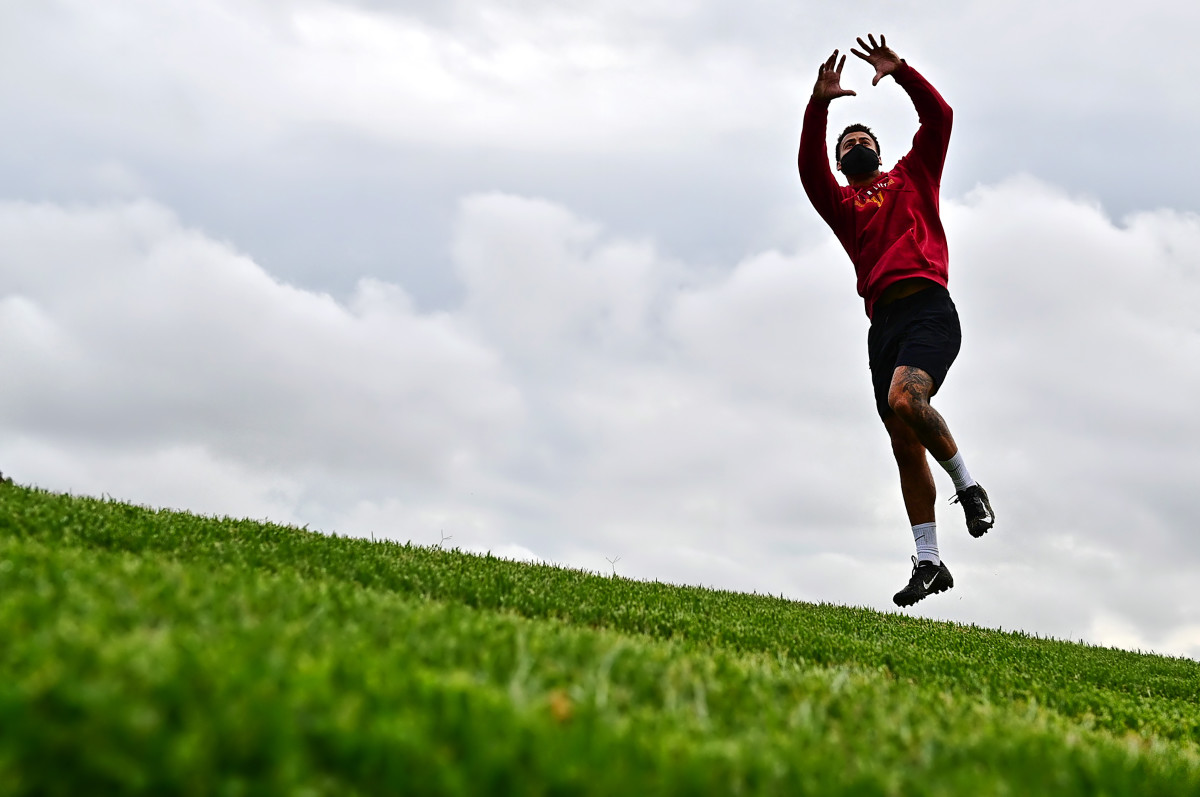
Those perfect scores only confirm a dedication to the receiving craft that, to draw from one painful example, had Pittman running routes one day before the combine, despite having undergone a root canal that morning. Between four years of game tape at USC (showcasing his strong blocking ability, jump-ball acumen and adaptability—he hauled in passes from six different Trojans QBs), a week of practices at the Senior Bowl (which he missed with a foot injury) and his appearance at the combine (where he crushed the three-cone and 20-yard shuttle drills), the book on Pittman’s NFL potential is amply filled.
“To a large extent, their evaluation is as complete as it could be,” says Pittman’s agent, Andrew Kesler. “The fact that there is so much less going on before the draft—Michael is probably someone who would actually benefit from that, versus an underclassman or someone with an off-field concern or someone who was injured. It’s not going to help a guy coming from D-II, who can’t have a workout or a pro day.”
Then there’s Pittman’s name, which, in a year absent face-to-face interactions, is lending certain decision makers a sense of familiarity. While exchanging pleasantries at the start of a video chat with the Raiders, coach Jon Gruden waxed nostalgic about working with Michael Sr. in Tampa. Niners general manager John Lynch, a former teammate of Senior’s, asked Michael Jr. to say hello to Dad. As did former Buccaneers defensive backs coach Mike Tomlin. “All of them have stories,” Michael Jr. says. “It’s almost like we have a prior connection. It just makes it easier.”
Every advantage matters, though Pittman isn’t too concerned about his stock heading into Thursday’s first round. “I’m thrown around everywhere [in mock drafts],” he says. “I feel like I can go early; that’s what I’ve worked for,” he says. “We’ll just have to wait and see.”
What more can he do? What more can any of us do—with sports, with work, with anything? Before the live portion of the draft was nixed, Pittman was close to booking a trip to Las Vegas, planning to enjoy the festivities up close. Instead, he’ll sit on the couch with Galli, eyes glued to the television. Maybe they’ll order food. Perhaps a camera will roll for YouTube. Mycah has decided he’ll be there, traveling from Arizona, against their father’s best wishes. Otherwise no family members will attend; they're all relegated to celebrating that life-changing day from afar.
Even so, as the picks are punched into cyberspace later this week, perhaps Pittman won't be that much different from so many prospects before him. Pacing around the house. Biting his nails. Waiting for that precious moment when his name is called and the telephone rings.
